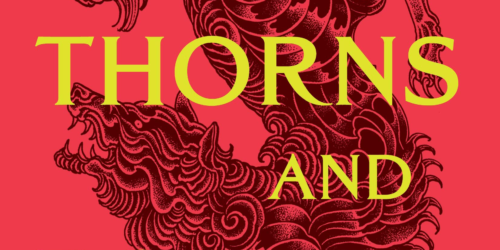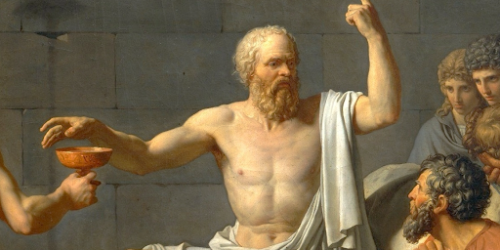Dune Post Mortem: Zen and the Art of Thinking Machines

As of this month, Words About Books has officially covered all of the Dune books written by Frank Herbert. It’s a strange feeling. Words About Books can often be a sarcasm-filled mess of rants, interruptions, and audio memes. In addition to its being a difficult environment for emotional honesty, it can be difficult to say exactly what you mean, in the moment, on a podcast. As I listened to the final edit of our final episode on these books, I realized there was one major topic that I never had a chance to properly cover.
Dune is both famous and infamous for its references to Islam. The fremen are very obviously Arab-coded, and much of the plot revolves around their culture and religion. In the background, though, there are several references to Buddhism, particularly Zen Buddhism. Over the years we’ve been reading Dune, I have been on a parallel journey that started with an interest in vipassana meditation and developed into a deep dive into Buddhism. As a result, I’ve found it difficult to ignore the many Zen Buddhist themes that emerge as the Dune Chronicles go on. Hear me out.
Dune initially caught my attention because it was the first science fiction book I read that dared to imagine a far future without sophisticated computers. Not only did Dune imagine a world without computers, it imagined a world that loathed computers. Frank Herbert created a world in which these thinking machines were haram. The civilization in Dune circumvented the need for computers by taking the human mind to its absolute limit. To achieve this, they used all the tools at their disposal: intense training, religious engineering, mind-expanding drugs, and yes, even eugenics. In spite of their intense effort and moral flexibility, the civilization described in Dune was still fundamentally flawed and destined for extinction.
The Bene Gesserit, arguably the most important and the most interesting institution in all of Dune, recognized the flaw and sought to correct it. They recognized that humanity was stagnating. For all its futuristic technological powers, The Empire was just a feudal aristocracy operating on a large scale. The Bene Gesserit began a plan to create a Kwisatz Haderach, a being who could lead humanity out of its stagnation. They got more than they bargained for.
Frank Herbert was not a scientist. The science fiction of Dune is mostly set dressing. Dune is, at its core, a work of political philosophy. The vast majority of the text of the Dune Chronicles is spent on long Socratic dialogs between characters representing recognizable societal archetypes in our real world. Herbert is most interested in the ways in which human societies are organized, and what a proper society should look like. He looks at this from economic, religious, and military perspectives. Dune places a lot of emphases on the power of religion to effect societal change. Religion and government have been closely linked possibly since the very beginning of our species. The idea that they should or could be separate institutions is relatively new and is under constant attack from various groups. The Bene Gesserit are clearly one of Herbert’s favorite factions. They are a quasi-religious organization committed to their own self-improvement and to the improvement of the human species. Their species-wide perspective can make the Bene Gesserit seem cold, or even malicious, but I believe that this is rarely the case. Bene Gesserit characters are often sympathetic, and in the final two books of the series, they take center stage.
To the Bene Gesserit, religion is a useful tool, but their cynical treatment of it ultimately rebounds on them. A key blind spot for the Bene Gesserit is their own unexamined aversion to certain cardinal sins. Romantic love is one such sin. The Bene Gesserit failure to properly account for love leads to the creation of a rogue Kwisatz Haderach. Paul Atreides is the product of Jessica’s love for Duke Leto and the Fremen’s hyper-religious zeal. Paul is able to see the path that must be taken to ensure humanity’s survival, but he lacks the will to see it through. His attachment to his own ego and self-image prevent him from accepting the debasing and self-destructive role required to lead to humanity out of stagnation. The task of implementing The Golden Path falls to Paul’s son, Leto II. Leto II must forsake his own humanity and become the monstrous God Emperor, suppressing and yet carefully guiding humanity to a future in which we are too numerous and too diverse to ever be entirely defeated.
Leto II possesses prescience on a scale that has never existed in the universe before. He is capable of accessing the entirety of his ancestral memories. He is the embodiment of human knowledge, and yet because of this, is incapable of ever being truly human. It’s questionable if there even is a personality that we could rightly call Leto II. To maintain a level of sanity, he has had to form a kind of conglomeration with the many minds inside of himself. We could say that Leto II represents an enlightened being.
Leto II, with all of his powers and knowledge, sees into the true nature of humanity. His behavior is often shocking to those around him. In spite of becoming a self-described “tyrant”, I believe that Frank Herbert would have us sympathize with Leto II. He may have become an insane, alien God, but that doesn’t mean he’s wrong. It’s telling, then, that those who should be his closest allies are his greatest frustration.
“But the only people I have considered eliminating are the Bene Gesserit.”
Her shock was too great for words.
“They are so close to what they should be and yet so far,” he said.Herbert, Frank. God Emperor of Dune (p. 300). Penguin Publishing Group. Kindle Edition.
I interpret Leto II’s frustration to mean that the Bene Gesserit may have been too close to the solution for too long. They have obtained genuine insight into the true nature of things, but they have stagnated along with the rest of humanity. Their nearness to the answer and their confidence in their own expertise have become their chief stumbling block. A stumbling block which may prove insurmountable. The Bene Gesserit have lost what Zen practitioners call “Shoshin” or “Beginner’s Mind”.
There is a proverb I have heard several times in Zen circles. It goes like this. A scholar visited a Zen master. The scholar asked the Zen master to teach him about the Zen practice. When the Zen master spoke the scholar would interrupt with his own ideas and comments. He seemed more interested in demonstrating his own knowledge than in hearing what the master had to say. The master suggested that they should have tea.
The master pours the scholar a cup of tea. The cup filled, but the master kept pouring. Eventually the tea spilled onto the table and then onto the scholar. The scholar shouted for the master to stop. The cup was already full. The Zen master replies that the scholar is like that cup. He is so full of ideas that nothing more will fit in. He should return with an empty cup if he wishes to learn.
Leto II makes a similar point to the Bene Gesserit with regard to their expertise.
“Specialists are not to be trusted,” Leto said. “Specialists are masters of exclusion, experts in the narrow.”
“We hope to be architects of a better future,” Anteac said.“Better than what?” Leto asked.
Luyseyal eased herself a fractional pace closer to Leto.
“We hope to set our standards by your judgment, Lord,” Anteac said.
“But you would be architects. Would you build higher walls? Never forget, Sisters, that I know you. You are efficient purveyors of blinders.”
“Life continues, Lord,” Anteac said.
“Indeed! And so does the universe.”
Herbert, Frank. God Emperor of Dune (pp. 235-236). Penguin Publishing Group. Kindle Edition.
In his book, Zen Mind Beginner’s Mind, the monk Shunryu Suzuki says “If your mind is empty, it is always ready for anything, it is open to everything. In the beginner’s mind there are many possibilities, but in the expert’s mind there are few.” This is a lesson that Leto II seems to be trying to impart to the Bene Gesserit. Note how Leto also questions the Bene Gesserits’ desire to be “architects.” There is another interesting quote from Shunryu Suzuki.
“Even though you try to put people under control, it is impossible. You cannot do it. The best way to control people is to encourage them to be mischievous. Then they will be in control in a wider sense. To give your sheep or cow a large spacious meadow is the way to control him. So it is with people: first let them do what they want, and watch them. This is the best policy. To ignore them is not good. That is the worst policy. The second worst is trying to control them. The best one is to watch them, just to watch them, without trying to control them.”
― Shunryu Suzuki, Zen Mind, Beginner’s Mind: Informal Talks on Zen Meditation and Practice
This sounds very much like something that Leto II would say. He is attempting to foster a revolutionary spirit in his people. His hope is that they will eventually break free from him and explode into The Scattering. The Bene Gesserit would seek to architect a future for humanity, but this isn’t possible nor is it desirable. Reality will never adhere to our designs, no matter how well-layed our plans. In planning, we narrow the possibilities. We hamstring our ability to take action in the moment.
This reminds me of something Paul says about the nature of prescience.
I succumbed to the lure of the oracle, he thought.
And he sensed that succumbing to this lure might be to fix himself upon a single-track life. Could it be, he wondered, that the oracle didn’t tell the future? Could it be that the oracle made the future? Had he exposed his life to some web of underlying threads, trapped himself there in that long-ago awakening, victim of a spider-future which even now advanced upon him with terrifying jaws.Herbert, Frank. Dune Messiah (pp. 47-48). Penguin Publishing Group. Kindle Edition.
The Oracle is the ultimate expert. They know everything and as a result they are incapable of doing anything. Zen Buddhism teaches that the past and the future are both inaccessible. Only the present moment is real. Only in the present moment is any action possible. Only in the present moment are we alive. The Bene Gesserit, with all their expertise, and their religious proscriptions against artificial intelligence have failed to make a critical insight: planning and foresight, when taken to their extremes, are as crippling to humanity as thinking machines.
Leto II explains that the thinking machines may have been dangerous, but equally dangerous was the attitude that they fostered within humanity. By outsourcing our decision making we ceased to truly live.
“The target of the Jihad was a machine-attitude as much as the machines,” Leto said. “Humans had set those machines to usurp our sense of beauty, our necessary selfdom out of which we make living judgments. Naturally, the machines were destroyed.”
Herbert, Frank. God Emperor of Dune (p. 364). Penguin Publishing Group. Kindle Edition.
Yet, Leto II employs thinking machines.
“An Ixian machine? You defy the Jihad!”
“There’s a lesson in that, too. What do such machines really do? They increase the number of things we can do without thinking. Things we do without thinking—there’s the real danger. Look at how long you walked across this desert without thinking about your face mask.”Herbert, Frank. God Emperor of Dune (p. 479). Penguin Publishing Group. Kindle Edition.
“Mindfulness” is a phrase that is often associated with Buddhism. It is a difficult to describe mindfulness in a few simple words, but essentially mindfulness refers to being fully present in the moment. To mindfully wash the dishes, you simply wash the dishes. If your mind wanders to something other than washing the dishes, you acknowledge that it has wandered and gently adjust your focus back to the dishes. Multitasking and automation are poison to mindfulness. When you use a dishwashing machine to wash the dishes, you cannot be mindful of washing the dishes.
The more tasks we automate the fewer opportunities we give ourselves to experience reality in the present moment. It is possible for an individual to outsource their decision making to a machine and then use their newly found free time to engage in some other wholesome activity, but more often the person will find themselves scrolling Tiktok. When we give up the present moment in favor of killing time, we cease to be truly alive.
And yet, when the Empire removed machine intelligence from its society they did not magically solve all their problems. Religious proscriptions against the creation of thinking machines did not prevent the “machine-attitude” from creeping back in. The human tendency to want someone to do their thinking for them survived. What is a Kwisatz Haderach if not a machine that tells you what to do? Instead of creating a robot, they created a God Emperor. For the Bene Gesserit, the result of their creation was the same as if they’d made an artificial intelligence. The lesson stares them in the face, but they still cannot see it.
The Kwisatz Haderach refers to a “shortening of the way.” The Bene Gesserit recognized they had a difficult problem. They understood that humanity was stagnating. They sought a shortcut. But there are no shortcuts. We cannot get to the future faster if the future does not exist. The journey is not just more important than the destination, the journey is all there is.
On the podcast we’ve joked that things like the Landsraad, CHOAM, and The Spacing Guild rapidly become irrelevant as the Dune Chronicles progress. I think this is more than Frank Herbert having bitten off more than he could chew and discarding parts of the story that he no longer finds interesting. Instead, I believe that in telling the story, Herbert found himself increasingly disillusioned with these traditional power structures. Through Leto II, Herbert demonstrates to us that humanity needs something new. No leader, no legislature, no judge, and no God will be enough to ensure humanity’s survival. Humanity’s survival will be assured when individual human beings see reality for that it is and stop investing sovereignty into delusions. In other words, when they become enlightened.
Tellingly, the second half of the unfinished series was to focus on the Bene Gesserit, and the Bene Gesserit have an interesting approach to their own government. The Bene Gesserit (and Frank Herbert) have discovered through their time in the universe of Dune that governments and bureaucracies are something to be avoided.
All governments suffer a recurring problem: Power attracts pathological personalities. It is not that power corrupts but that it is magnetic to the corruptible. Such people have a tendency to become drunk on violence, a condition to which they are quickly addicted. —MISSIONARIA PROTECTIVA, TEXT QIV (DECTO)
Herbert, Frank. Chapterhouse: Dune (p. 81). Penguin Publishing Group. Kindle Edition.
When Odrade attempts to explain Bene Gesserit society to Scytale, he is mystified that they can function without some degree of bureaucracy. Odrade explains that Bene Gesserit training renders such institutions unnecessary.
Now he asked, “How do you maintain yourselves without officials and records?” He was deeply puzzled.
“A thing needs doing, we do it. Bury a Sister?” She pointed to the scene in the orchard where shovels had been brought into play and dirt was being tamped on the grave. “That’s how it’s done and there’s always someone around who’s responsible. They know who they are.”
“Who . . . who takes care of this unwholesome . . . ?”
“It’s not unwholesome! It’s part of our education. Failed Sisters usually supervise. Acolytes do the work.”
“Don’t they . . . I mean, isn’t this distasteful to them? Failed Sisters, you say. And acolytes. It would seem to be more of a punishment than . . .”
“Punishment! Come, come, Scytale. Have you only one song to sing?” She pointed at the burial party. “After their apprenticeship, all of our people willingly accept their jobs.”
Herbert, Frank. Chapterhouse: Dune (p. 127). Penguin Publishing Group. Kindle Edition.
The Bene Gesserit training teaches one to do what needs doing without undue thought given to one’s own preferences or ego. The Bene Gesserit system of simply doing what needs doing when it needs to be done reminds me of a Zen koan.
In Buddhism there is a bodhisattva (a deity who has attained enlightenment but remains in the world to help others) named Avalokitteshvara or The Bodhisattva of Great Compassion. This bodhisattva is represented as having many arms and each hand on each arm has an eye. The following koan takes the form of a dialog:
Yunyan asked Daowu,
“How does the Bodhisattva of Great Compassion (Avalokiteshvara) use so many hands and eyes?”
Daowu said, “It’s just like a person in the middle of the night reaching back in search of a pillow.”
Yunyan said, “I understand.”
Daowu said, “How do you understand it?”
Yunyan said, “All over the body are hands and eyes.”
Daowu said, “What you said is roughly all right. But it’s only eighty percent of it. “
Yunyan said, “Senior brother, how do you understand it?”
Daowu said, “Throughout the body are hands and eyes.”
Koans are a bit like riddles. These are used in some lineages of Buddhism to provoke enlightenment or a deeper understanding of reality by forcing the mind to ponder things that are paradoxical or bizarre. I am not a trained Buddhist, but I have heard interpretations of this koan that seem to apply to the Bene Gesserit power structure.
When Daowu answers that Avalokiteshvara’s use of their many hands and eyes is like a person in the middle of the night reaching back in search of a pillow, he means that they are addressing a need that has arisen without any need for the involvement of ego or the self. If one needs a pillow in the middle of the night, one reaches out into the dark for where the pillow is. One does not need to consider the problem of discomfort. One does not need to search for the pillow. A need arises, and one of the many arms of the Bodhisattva of Great Compassion acts in accordance with that need.
This is how Bene Gesserit society works. When something needs done, a true sister of the Bene Gesserit does it. They do not consider whether or not the task appointed to them is worthy of their station. They do not consider themselves. Instead, they act in perfect accord with the nature of their society and universe. The Bene Gesserit have eliminated the problems of government by eliminating the need for government. They have created a population of individuals who see reality as it is, and who are capable of acting in accord with the needs of that reality. The Bene Gesserit still have the Proctors who are capable of corrective action, but even this need not be enshrined into “law” because the Proctors do not consider abusing their power.
“We call them Proctors. A sort of Jury of the Whole.” Now you’ve confused her.
“And no laws . . . regulations, whatever you want to call them?”
“Didn’t I say we defined them separately? Regulation—past. Law—future.”
“You limit these . . . these Proctors, somehow!”
“They can arrive at any decision they desire, the way a jury should function. The law be damned!”
“That’s a very disturbing idea.” She’s disturbed all right. Look at how dull her eyes are.
“The first rule of our democracy: no laws restricting juries. Such laws are stupid. It’s astonishing how stupid humans can be when acting in small, self-serving groups.”
Herbert, Frank. Chapterhouse: Dune (p. 217). Penguin Publishing Group. Kindle Edition.
Hebert again reiterates the point that in crafting their government the Bene Gesserit have sought to eliminate bureaucracy as it can serve only as a vehicle to elevate the worst kinds of people into positions of power.
“Isn’t it odd, Dama . . .” No reaction; continue. “…how rebels all too soon fall into old patterns if they are victorious? It’s not so much a pitfall in the path of all governments as it is a delusion waiting for anyone who gains power.”
“Hah! And I thought you would tell me something new. We know that one: ‘Power corrupts. Absolute power corrupts absolutely.’”
“Wrong, Dama. Something more subtle but far more pervasive: Power attracts the corruptible.”
Herbert, Frank. Chapterhouse: Dune (p. 212). Penguin Publishing Group. Kindle Edition.
Bureaucracy is just another way that we outsource our problems. Lucilla goes on to explain that bureaucracy is dangerous and will always collapse because it allows us to create the illusion of action. Real action comes from those who act in response to a need because a need has arisen, not because they believe that the action will benefit a non-existent “self”. Committees were the first thinking machines. Rather than acting ourselves, they allow us to send the problem to someone else to deal with. There are plenty of someone else’s to share the blame, and to argue indefinitely and ultimately to accomplish nothing. The individuals on the committee are likely to take action only to enrich themselves rather than to respond to the genuine needs of others. Just as the machines did not have your wellbeing in mind after they started thinking for you.
The Bene Gesserit, like The Great Bodhisattva of Compassion, do what needs to be done without a thought to their own ego or discomfort or pleasure or reward. They simply do. The Bene Gesserit have learned that all attempts at shortcuts are doomed to failure. To live in the moment, to do what needs done when it needs done, is to have achieved the opposite of the machine mind. This is what it means to be a living human. This is what it means to be enlightened.
It is important not to forget the lesson of The God Emperor, though. Lucilla explains in different words that laws are another form of mental outsourcing. When something becomes outlawed one no longer needs to consider it as an option. They blind themselves to a part of reality. What is The Butlerian Jihad’s proscription against creating a machine in the image of a human mind if not a law?
We must constantly question our preconceived notions and biases. We must approach every situation, every tool, every law, with a fresh mind and an empty cup. We must live in the moment, not in the far past of The Butlerian Jihad, nor in the far future of The Golden Path. We must replace our “machine attitude” with a “beginner’s mind.”
If the Bene Gesserit are able to recognize this, they will be able to become what Leto II implied that they should be: teachers. The Bene Gesserit have the potential to be a way forward for humanity on its path to enlightenment. This was their goal, but only now when they are faced with the Honored Matres do they realize exactly what it will mean.
Chapterhouse ends with The Honored Matres being assimilated into the Bene Gesserit order. There are many who resist this change, clinging to the past and fearing the future, but this is the only action that can be taken right now. Murbella and Odrade simply do what must be done. It is the only way for humanity to survive.
Unfortunately, Frank Herbert was not able to give The Dune Chronicles a proper conclusion. I find myself wondering what the ultimate lesson of the series would have been (for many reasons, I put very little stock into Brian Herbert and Kevin J. Anderson’s attempt at a conclusion). As I sit here in a swing state, in American, in 2024, I must admit that I am not optimistic about the state of the world’s governments and my own in particular. There are dozens of policy changes that I passionately advocate for with little hope of ever realizing. I feel that I am beset on all sides by charismatic leaders and thinking machines. Neither of which are likely to go anywhere anytime soon.
In the midst of this chaos, I started building a meditation and mindfulness practice. I still plan for the future, but I try to do my best to live in the present. I find that abandoning the “machine-attitude” makes me a generally more patient and compassionate person. I’m still politically engaged, but I now understand that the dishes in my sink are simply more real than the latest poll numbers. Seeing a dish in need of washing and washing it is more fulfilling than getting into another argument on social media.
And maybe that’s the real message of Dune…





